#Institute for Women’s Policy Research
Text
In the US Supreme Court’s landmark ruling to revoke a constitutional right to abortion care, Justice Samuel Alito suggested that the “attitudes about the pregnancy of unmarried women” have changed.
“Modern developments” like medical leave for pregnancy and childbirth are “guaranteed by law” in many cases, medical care is “covered” by insurance, and “safe haven laws” allow people to drop off babies anonymously to give them up for adoption.
But such “modern developments” fail to reflect that the US has some of the worst economic and health outcomes for women and families, while only a fraction of workers get anything close to “guaranteed” leave, and eliminating access to abortion care can have devastating economic costs.
In a hearing on the far-reaching consequences of anti-abortion laws on 29 September, US Rep. Alexandria Ocasio-Cortez said that denying abortion access to millions of Americans is a “profound economic issue”.
“Forcing poor and working class people to give birth against their will, against their consent, against their ability to provide for themselves or their child is a profound economic issue,” she told the House Oversight Committee. “It certainly is a way to keep a workforce, basically, conscripted.”
In the 27 states poised to severely restrict or outlaw abortion without protections from Roe v. Wade, none have paid family and medical leave, and 18 have gender wage gaps above the national average, according to Center for American Progress.
Women live in poverty at rates above the national average in 22 of those states, and children live in poverty at rates higher than the national average in 17.
19 states also have not expanded Medicaid, the federal healthcare programme for low-income Americans, to provide care up to 12 months after giving birth.
Without a “robust federal and state” effort to strengthen the nation’s social safety net, people unexpectedly facing parenthood are “likely to fall even further through the cracks – with downstream effects on their children, communities, and local and state economies,” according to the report.
“The idea that abortion and access to abortion is somehow not a profound and central economic and class issue and class struggle is certainly something that I think a person who has never had to contend with the ability to carry a child – it belies that perspective,” according to Ms. Ocasio-Cortez.
“Abortion rights are a class struggle too,” she added on Twitter. “When the powerful force people to give birth against their will, they trap millions into cycles of economic setback and desperation. Especially in a country without guaranteed healthcare. And desperate workers are far easier to exploit.”
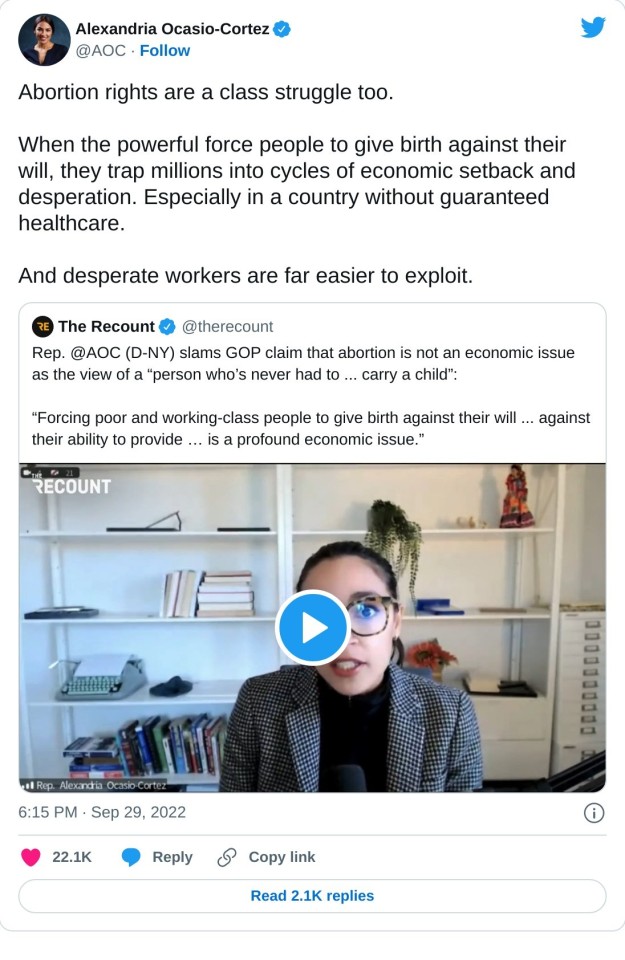
One study found that patients who were denied an abortion experienced “a wide range of negative financial consequences,” including lower credit scores, increased debt, greater risk of bankrupty and eviction from their homes.
The study also found that those abortion restrictions were linked to a higher risk of child poverty and poor developmental outcomes among children.
Another study following two groups of women over 10 years – including one group that access abortions and another that wanted to but could not – found that people who were denied an abortion sank deeper into poverty as a result.
In 2021, the Institute for Women’s Policy Research found that restrictive abortion laws cost state and local economies $105bn from workforce reductions and earnings levels and increasing turnover and time off from work among women ages 15 to 44 years old.
Medical costs for birth are also expensive, even with insurance coverage. The average cost for vaginal deliveries in 2015 was roughly $4,300, and $5,200 for caesarean births, according to a study of more than 600,000 women between 2008 and 2015 who had health coverage through their employer.
“Policymakers and advocates must recognize that the fall of Roe is an economic issue and would be one more victory for the economics of control and disempowerment – low wages, little worker power, and rising disinvestment,” according to a report from the Economic Policy Institute. “Reproductive justice is key to economic justice and protects women’s humanity, dignity, and the right to exert freedom over their own choices in the economy.”
#us politics#news#the independent#rep. alexandria ocasio cortez#abortions#abortion bans#roe v. wade#reproductive rights are human rights#reproductive rights#reproductive health#2022#house oversight committee#twitter#tweet#Institute for Women’s Policy Research#Economic Policy Institute#economy#economics#classism#class struggle#class warfare#us healthcare#medicare#maternity leave#paternity leave
41 notes
·
View notes
Text
Eric Hananoki at MMFA:
Since the Supreme Court overturned Roe v. Wade in 2022, news outlets have published numerous stories documenting how restricted abortion access has medically harmed women across the U.S. In contrast, numerous groups involved with Project 2025, including lead organizer The Heritage Foundation, have falsely claimed over the years that abortions are never medically necessary.
The Associated Press reported that doctors have said “that there are many circumstances in which abortion — meaning the termination of a pregnancy — can be medically necessary,” and AFP wrote that “the scientific consensus” is “that abortion is sometimes medically necessary.”
Since Dobbs, media outlets have also highlighted cases where state abortion bans have caused significant medical issues.
ABC News talked to “18 women from across 10 states who say their medical care was impacted by abortion bans -- bringing some of them to the brink of death.” ProPublica reported on how doctors “say they can’t give women potentially lifesaving care.” The Washington Post “found that many hospitals have failed to provide specific guidance or policies to help doctors navigate high-stakes decisions over how to interpret new abortion bans — leading to situations where patients are denied care until they are on the brink of permanent injury or death.” And the AP reported this week on how “abortion bans complicate risky pregnancy care.”
Media Matters has documented how Project 2025 seeks to significantly restrict reproductive rights in the country. Multiple Project 2025 partners have also continued to signal that they want to criminalize abortion.
Many groups that are in partnership with Project 2025, such as Susan B. Anthony Pro-Life America, Family Research Council, American Family Association, and lead sponsor Heritage Foundation, have all pushed anti-abortion misinformation falsely claiming that abortions are never medically necessary.
#Abortion#Pregnancy#Anti Abortion Extremism#Abortion Bans#Project 2025#American Family Association#The Heritage Foundation#Dobbs v. Jackson Women's Health Organization#Family Research Council#Eagle Forum#The Heartland Institute#Susan B. Anthony Pro Life America#Students For Life Of America#Young America's Foundation#Media Research Center#Ethics and Public Policy Center#California Family Council#AAPLOG
28 notes
·
View notes
Quote
The number of women in Texas who died while pregnant, during labor or soon after childbirth skyrocketed following the state’s 2021 ban on abortion care — far outpacing a slower rise in maternal mortality across the nation, a new investigation of federal public health data finds.
From 2019 to 2022, the rate of maternal mortality cases in Texas rose by 56%, compared with just 11% nationwide during the same time period, according to an analysis by the Gender Equity Policy Institute. The nonprofit research group scoured publicly available reports from the Centers for Disease Control and Prevention and shared the analysis exclusively with NBC News.
Pregnancy deaths rose by 56% in Texas after 2021 abortion ban, analysis finds
Republicans hate women. Vote blue.
638 notes
·
View notes
Text
We’ve been chatting for about half an hour when Eloise lowers her voice to a whisper. Until now she’s been confidently talking through the ups and downs of being a 19-year-old woman in a world she finds unsteady.
She’s annoyed that, on TikTok, the advertisements she gets are keyrings with rape alarms and “stabby kitties” (a cat-shaped metal keychain with pointed ears sharp enough to cause damage), feels that modern feminism sometimes goes a bit too far, but having grown up in the age of nudes, she doesn’t really trust men. Which is unsurprising considering the story she tells me next.
“So a boy I know was asking a girl at his school for nudes,” she says, quietly. “And then when she refused, he threatened to rape her.” The boy was 14 and had recently posted an Andrew Tate video to his Instagram page, which was Eloise’s first encounter with the online influencer.
“It said stuff like how women are your property and that it doesn’t matter if women say they’ve been sexually assaulted; if you’re with them that’s your right. I didn’t like it,” she adds.
Tate has made several appearances in the headlines this week. On Tuesday, a Romanian court rejected his appeal to ease the ban on him leaving the country as a legal case against him – in which he’s charged with human trafficking, rape and forming a criminal gang to sexually exploit women – continues. He denies all charges against him. The following day, Ipsos polling for King’s College London’s Policy Institute and the Global Institute for Women’s Leadership found that one in five men aged 16-29 who have heard of Andrew Tate have a positive view of him.
Separately – or, arguably, perhaps not – another survey published in the same week underpinned a renewed focus on the attitudes and beliefs of Generation Z, this time from the Crown Prosecution Service (CPS). The research asked just over 3,000 adults of varying ages – 50.6 per cent of whom were female – about their understanding of rape and serious sexual offences, and the law on consent, and drew troubling conclusions.
Overall, 74 per cent of people surveyed understood that it can still be rape if a victim doesn’t resist or fight back, but the number fell to just over half (53 per cent) of 18-24-year-olds who had the same understanding. Less than half of respondents from this age group recognised that victims might not report a sexual offence to police immediately, that being in a relationship or marriage doesn’t mean consent can be assumed, or that if a man has been drinking or taking drugs, he’s still responsible if he rapes someone. More than 70 per cent of over-65s recognised that even if no physical force is involved a person might not be free or able to consent to sex, compared to just 40 per cent of young people.
Previous generations have become used to hearing that rape myths and misconceptions continue to persist, but that’s precisely why this week’s grim trinity of headlines stings. “There tends to be a public assumption that things are generally always getting better,” says author and feminist campaigner Laura Bates. “Actually, views like these are incredibly widespread among young people.”
Bates regularly works with schools, talking to pupils who often tell her that “rape is a compliment”, that “it’s not rape if she likes it” or, “it’s your boyfriend, you have to have sex with him”.
She adds: “Attitude surveys have to be taken seriously because they are a real red flag that we’re going backwards – we’re seeing much more extreme and concerning misogynistic attitudes among the youngest generations than we are among the oldest. We have to face up to that and ask, why is that happening?”
Gen Z has never been neatly contained. Growing up as the first digital natives in the chokehold of crisis – climate, Covid, cost of living – has seen them praised for their social awareness, but disenfranchised and forgotten by politics. Their extremely online nature has given them unprecedented access to the world and other people – but, of course, that’s a double-edged sword.
“The internet has made everyone’s voices louder, but that means the most misogynistic people in the world are heard more too,” says Niya Clement-Hickson, a 26-year-old marketing designer from London. He says his generation has been “kind of ruined” by social media.
“You’d be surprised at just how many people around my age will argue that Andrew Tate is not as bad as he seems.”
When I spend an hour talking to 16-year-old Tate fan Manus from Ohio on TikTok, he says exactly that. He’s relatively timid and seems unsure of what he thinks at times, but came across Tate aged 12, being drawn to his motivational speeches, humour, and attitude towards making money. “[Tate] kinda showed me how people really are in reality,” he says. On Tate’s assertions that women are the property of men, he says those beliefs are simply from the Bible (though Manus himself is Muslim).
He maintains he’s never seen Tate speak violently about women, and when I send him leaked voicenote recordings of Tate saying that he enjoyed raping a woman, Manus is certain it’s fake “probably to make him look bad”. I ask for his views on feminism and he responds that feminists now want “superiority” and “more rights”. What rights exactly? “More rights in general,” he says, vaguely.
This opinion is not a rarity – there’s a pervasive idea circling comments sections and pub corners that the pendulum has “swung too far”. “Some of us warned that when you continue to suppress their identity by telling young boys that they are inherently toxic, they’ll start acting irrational,” one comment under an Andrew Tate post this week read. But it’s not just boys who hold this idea. Early last year, a survey from Ipsos UK and the Global Institute for Women’s Leadership at King’s College London echoed this and some of Eloise’s views that feminism has gone too far. They found that 52 per cent of Gen Z and 53 per cent of millennials believe that we’re now discriminating against men. Less than half of Gen Z respondents said they defined themselves as a feminist.
Was it coincidence then, to see that shortly after the research was published in March 2023, the year of the girl was in full swing? A persistently pink summer was punctuated with girl dinners, #tradwives – modern women who believe in traditional gender roles – and stay-at-home girlfriends sharing their daily rituals on news feeds. New York magazine’s The Cut declared it “Woman in Retrograde” as the year came to a close; a cluster of reactionary elements to a significant demise of mainstream feminism.
This shift back to traditional behaviours is also present in younger men, says Niya. “A lot of guys feel that their role is all about providing money, being a protector. But they feel they deserve to get something out of the interaction. They just can’t deal with being told no.”
In terms of consent, does he hear attitudes that put women in danger? “Absolutely,” he replies. Niya didn’t learn about consent in school – “I don’t think it was ever talked about beyond ‘don’t have sex until you’re old enough’” – and thinks this is quite common for men of his age. For Maya, who’s 24 and neurodivergent, the line of consent is difficult to pinpoint and somewhat shaped by social media. There’s a “disconnect” from what she really wants – and is able to articulate – in the moment.
“I think that we do have less and less sex and more and more porn,” Niya adds. “And I think that once porn is your main and in some cases, only engagement with sex and women, then that is going to completely screw up how you see sex.”
Do all roads lead to porn? Probably. Clare McGlynn, who is a professor of law with particular expertise in sexual violence and online abuse, says: “We know that algorithms promote more extreme content, more hate – and many, many younger people, men and women, are getting this. Millions of people, as we speak, are watching mainstream online pornography that is racist, sexist, misogynist and violent in its content. Of course, it’s shaping attitudes and lives.”
“There’s certainly a pressure on young boys and men, for example, to be taking and sharing nudes – they’re part of a culture that is encouraging them to,” McGlynn explains. During a study, she looked at what material was presented on the homepage of popular sites – she found landing pages which were filled with sexually violent material. “So it’s also not them even actively choosing that material; we’re part of a culture that is grooming young men, teaching them expectations around sex – and asking them to accept and normalise it.”
What appears clear from the survey conducted by the CPS is a dangerous lack of understanding of what constitutes a crime. “I do lectures on criminal law and I’ve had students come up to me afterwards and say that they didn’t know they had been sexually assaulted or raped,” McGlynn adds.
Laura Bates says that we’re in the midst of a “crisis of sexual violence among young people”.
“Deeply misogynistic misinformation is being spread to young people online at a rate that most people just have absolutely no idea about,” she says. “And there is a massive knock-on effect.
“Some will look at these surveys and go, well, what does attitude matter? But you have to draw a connection between these really worrying attitudes about rape and the fact that nearly 80 per cent of young people told Ofsted inspectors recently that sexual assault is normal and common in their friendship groups.”
So what can be done? More responsibility and accountability from social media companies, says Bates. Tate’s content – some of which reportedly shows him attempting to beat a woman with a belt; she later hides behind a locked door – has been viewed more than 11 billion times on TikTok, she says, adding: “That’s more than the population of the planet.” Last year, advocacy group HOPE found that more 16-17-year-old boys had watched Tate’s content than had heard of Rishi Sunak. “I think it’s really important that the government supports high quality, age-appropriate sex and relationships education,” she adds.
Actively listening to and engaging with boys – as seen in initiatives like the state of New York’s Starting the Conversation campaign – is also important. Boys must have a safe and judgement-free environment to express themselves: the more their experiences of rape culture are internalised, the more difficult they are to see.
The Online Safety Bill, which was enacted in October last year, she says, was a missed opportunity for change. While it asks for more transparency on social media platforms and imposes sanctions for those not following the act, along with criminalising cyberflashing and sending unsolicited nude images, “it went 250 pages without mentioning women and girls once, until campaigners changed that”, Bates says.
“It’s so much more effective to focus on prevention of radicalisation than trying to unpick it once it’s happened,” she says. “Young people really are prepared to listen and prepared to change their minds, it’s just a shame this isn’t happening in every school.”
“It does make me worried about how safe the world is going to be,” says Eloise, who will begin her twenties in the summer. “What if people really start thinking that women are property again?” Then, she’s quiet again. “I really hope it can change.”
403 notes
·
View notes
Note
Kind off topic from your actual posts but I like when you use the phrase “ceding ground” in an argument. I may have said this before. It’s a little combative which is helpful in terms of thinking about what in the goal of making a certain statement or responding to something someone said.
YES!!!!! it has been so helpful to my understanding of the world to think of all discourse as ‘situated,’ as part of and connected to (contested) social and political contexts. speech is an act that does something in the world. It is why we understand saying “I do” or “I promise” is both a speech and an act, not merely speaking but speaking a social obligation into existence through speech. And we also understand that these words are backed by various forms of power - “I do” as a wedding vow is a speech-act, but one that only has force as a speech-act because the church and the state enshrine marriage legally & institutionally. To say “I do” is to get married, to enter into a social unit (‘the family’ or ‘the household’) that is the foundation of many state administrative and economic processes like census data, tax records, wages, urban planning, social service provisions, and so on.
And in that context we understand that speech is not just contributing free-floating ideas to some public square or marketplace where we all weigh and measure the merits of each one, but that it is tied to and articulates specific visions of power. When speaking of “biological sex,” this is not an innocent or simple ‘fact’ that is being contested; you are invoking the authority of medical institutions that produce this source of knowledge & all the violences therein. You are invoking justifications for eg US political histories of white women being as legally classified as non-labourers and non-white women as an eternally labouring underclass. You are invoking histories of psychiatric violence that insists transgender people are suffering from behavioural, sexual, and identity disorders. You are invoking the rationale behind medical violence done to intersex people. “Sex is biological” is a violent sentiment because it is produced as knowledge through violence.
And of course many people don’t realise they are doing this, they don’t know these histories, but the principle is generalisable and can be recognised by anyone (hate speech is probably the most ‘classic’ example for guys who love talking about free speech, see also yelling “bomb” in an airport). discourse is historically situated & the refusal to acknowledge this is endlessly frustrating. Like the “Protestant work ethic” didn’t emerge from the ground fully formed one day, it was produced in material processes of history. You don’t just ‘say’ something, you articulate visions of power. And “sex is biological” is a eugenicist, colonial vision of power. That is contested ground and not an inch should be given, not in discourse, not in research, not in policy, not in law
104 notes
·
View notes
Text
Brazil’s ban on X: how scientists are coping with the cutoff
Some are pivoting to alternative social-media platforms and scrambling to rebuild their networks.

After the social-media platform X was banned in Brazil last week, scientists in the country began scrambling to find another online forum for posting about their research, communicating with collaborators and staying abreast of scientific advances. “Following journals and key people always kept me on top of things,” says Regina Rodrigues, a physical oceanographer at the Federal University of Santa Catarina in Florianópolis, Brazil.
Some feel isolated because of the change. “I’ve lost contact with colleagues and European research groups I joined during my postdoc in Spain,” says Rodrigo Cunha, a communications researcher at the Federal University of Pernambuco in Recife, Brazil.
Others are more sanguine, pointing out that many researchers had already left X (formerly Twitter) after billionaire Elon Musk bought it and changed its policies, including those related to content moderation and how users could be ‘verified’, or deemed an authoritative source of information. Sabine Righetti, a science-communications researcher at the State University of Campinas in Brazil, exited the platform early last year owing to what she perceived as an increase in aggressive messages, especially targeting scientists, journalists and women. “I am these three things,” she says.
Ronaldo Lemos, chief scientist at the Institute for Technology and Society in Rio de Janeiro, says the ban might offer a glimpse of what the world would be like without X. Social networks come and go, he says, pointing to some that have shut down, such as Google’s Orkut, which closed in 2014 and was once popular in Brazil. “People adapt and look for ways to reconstruct their networks in other places," he says.
Continue reading.
#brazil#brazilian politics#politics#twitter#science#elon musk#alexandre de moraes#supreme federal court#image description in alt#mod nise da silveira
53 notes
·
View notes
Text
Claims that Israel has been committing a genocide of Palestinians date to long before October 7. Yet the population of Gaza was estimated to be less than 400,000 when Israel captured the territory from Egypt in a war against multiple Arab countries in 1967. It’s now estimated at just over 2 million. Population growth of almost 600% would make it the most inept genocide in the history of the world.
Those repeating the word genocide over and over, turning it into a mantra that penetrates the public consciousness, smearing Israel and anyone who supports it, ignore the facts of this war.
This is not an unprovoked war, like Russia’s against Ukraine. It’s not a civil war between rival militias, like the one raging in Sudan — which, by the way, is being ignored by almost everyone, even though the UN describes it as one of the “worst humanitarian crises in recent memory,” where a famine could kill 500,000 people.
No, Israel was attacked. On October 7, Hamas launched a gruesome assault on Israeli civilians, killing some 1,200 — including many women and children — and dragging hundreds of them as hostages into Gaza. Today dozens — including many women and children — remain in captivity.
Those who keep saying that Israel’s response is an act of revenge rather than the strategic, defensive war that most Israelis view as a fight for national survival against a determined enemy backed by a powerful country are deliberately distorting reality. In doing so, they are perversely evoking the same false blood lust and grotesqueness embedded in the blood libel archetype.
Indeed, Hamas’ actions, which precipitated this war, don’t seem to exist in the minds of ostensibly humanitarian-minded protesters. Nor even the fate of the hostages, still captive in Hamas tunnels.
Although the campus protests vary in their message and actions from school to school, we never hear protesters chant that Hamas should release the hostages or accept a ceasefire. Quite the contrary. Accusations against Israel at times include praise for Hamas, one of whose aims — the end of the Jewish state — is shared by some key organizers of the student protests. As Secretary of State Antony Blinken recently said, “It remains astounding to me that the world is almost deafeningly silent when it comes to Hamas.”
Accusing Israel of genocide and putting the entire onus for stopping the war, putting all the blame for the deaths, on the Jewish state is even more astounding because Hamas — designated a terrorist organization by the US, the European Union and many other countries — is a group whose explicit goal, according to its founding charter, is not just to destroy Israel, but to kill Jews. That is the definition of genocide.
Still, the death toll, even by the Hamas count, does not in any way suggest a genocidal campaign. The terror organization puts the total at about 35,000. The figure, disputed by The Washington Institute for Near East Policy among other think tanks and researchers, includes Hamas fighters. That means the number of civilians killed, whatever the total, is actually lower.
Compare that to the death toll in Mosul, Iraq, where coalition forces uprooted ISIS from a city that had some 600,000 people at the time. Estimates of the exact number of deaths vary, ranging from 9,000 to 40,000 (the latter is the estimate of Kurdish intelligence). The lowest figure is on par with the rate of total deaths reported by Hamas authorities in Gaza that does not distinguish civilians from Hamas fighters, while the highest is four times greater.
I don’t recall hearing the term genocide used there, or in any of the battles that led to more than half a million people being killed in Afghanistan and Iraq during America’s wars there. And yet, Israel has been repeatedly smeared with this damning accusation.
143 notes
·
View notes
Text
How Project 2025 could radically reshape higher ed (insidehighered.com)
I know you've heard a lot of things about Project 2025 at this point and most of them are scary, but I think it's things like this that indicate that even the stuff in that plan that seems boring is very scary too. Here's a bit of an analysis on some of the plans regarding higher education.
Basically, they want to make it much, much harder to get student loans, and to make the loans you can get much harder to pay off. For so many people, the only way they'll ever be able to get a higher education is with the help of federal student loans. Without that assistance, and for degrees that don't guarantee a high-paying career quickly (such as art, history, literature-- so many subjects, most of them "soft-sciences") because having a high-income would be necessary to keep up with payments (as income-driven repayment plans will be eliminated)...a lot of people will not go to college. Particularly people from disadvantaged backgrounds.
So it would be that most high-school grads can't afford school, and the ones that take on loans have to prioritize careers that by nature aren't the ones taking on learning from history, culture, or political thought because it's hard to make money and advance quickly career-wise with those. It would gatekeep the "soft-science" subjects that tend to spur criticisms of society, history, and power to those who could afford to pay full-price-- who are also likely to be privileged and in the ruling class and thus the least likely to criticize the existing culture. And by gatekeeping that knowledge and its credentials, they could discredit anyone who hasn't studied the subject by saying that they are uninformed or uneducated and thus shouldn't be taken seriously. They would be in full control of the research being done and the types of papers being written. The end result is crippling the ability to even have academic discourse or research to refute their other policy goals.
Furthermore, the elimination of many repayment plans that already exist serves to punish the people who have already gotten degrees-- if you don't already have a stable job, trying to keep up with higher payments while your taxes go up (increasing tax rate for people making under $168k to 15% of income and eliminating pretty much every deduction, credit, and exclusion) and still affording the necessities (made much harder when Medicaid, SNAP, other social safety nets are cut) will be very challenging. And if you DO have a stable job and are educated on subjects that allow you to criticize the movement-- they can attack you and discredit you and make you lose that job if you publicly disagree. The way Project 2025 suggests restructuring the federal workforce is an example-- even if you're an expert, if you work in a federal agency and don't comply, you're gone.
The long-term purpose of all this is clear-- control the knowledge, control the history, prevent people from developing any skills to oppose you through research or academic theory, prevent people from going to institutions that can get them to question society and power. It is much harder to organize and develop ideas to oppose the people in power if you never get any chance to learn how or what others have done before you.
When the obstacles to getting educated become so great, so challenging, how many people will try? Why risk it, when you have more certainty working a blue-collar job instead? Why push young women to go to school when, if they take out loans, may not be able to maintain the payments if they get married and leave the workforce to have children-- or if they get pregnant (and will not be able to access birth control or an abortion) unexpectedly and also have to leave the workforce? With social safety net programs gutted and women forced to give birth upon becoming pregnant, and no early childhood education program to provide relief causing women to have to stay home, there would be no way to repay student loans for women who leave the workforce in this scenario. Being a woman is too much of a risk for higher ed in this world--how many will take that risk?
And none of this even scratches what Project 2025 wants to do to the colleges and universities themselves and how teaching certain subjects could cause them to lose funding. Again--how many will take that risk? Going bankrupt, or discussing critical race theory?
The real, long-lasting threat of this agenda, even beyond the immediate terrible effects on the LGBTQ+ community and disadvantaged communities, is to make life unlivable for those that disagree or exist in a way the right-wing doesn't like. It uses the whole of systems of power--governmental, financial, social, societal-- to work together in concert to make the only way to live be their way. It's not just one policy--it's all of them working together to crush people and make sure even those in a privileged position who could disagree...won't.
You know the call to action is to vote. But I'd also spend some time educating yourself on some of the more boring-sounding objectives in Project 2025. Don't feel pressured to read the whole thing yourself, because it's very long and dense as it IS actually written by smart and competent people who are conservative academics and former Trump staffers. That's why it's a problem-- these people are smart enough and know enough to make this plan work. But there are a lot of articles from reputable sources out there breaking down even the dullest-sounding parts of this plan-- please spend some time understanding the extent and educate those around you.
#us politics#politics tw#another post where i'm gonna be called stupid in the notes#while at the same time being told i shouldn't tell people bad news because it will make them not vote#seems to be a lot of those these days
31 notes
·
View notes
Text
You know what I would actually love to see? Productive liberal feminism. Because I have friends that I would call genuine liberal feminists, and I don’t think mainstream liberal feminism is at all what it should be.
In theory, right, if liberal feminism is feminist action through law, policy and regulation through existing institutions, it could do good things. Theorising about a feminist revolution and a perfect world, talk of culture and separatism is great and all, but we need to fix the world we currently live in so it’s friendlier to women as well, and i believe that’s what liberal feminism should be. There’s things to improve upon through law in the western world, but moreover there’s countless of things to fix and change in other countries to help women. I do honestly believe this kind of feminism is equal or even more important than radical/cultural feminism. I’ve considered shifting my own focus to things like this, considering I’m studying law and crime anyways.
A productive liberal feminism movement could help illegalize FGM worldwide, remove mandatory hijab or covering laws, have harsher punishments for offenders in honour killings. It could get more women into parliament, force law enforcement to take sexual crimes and hate crimes against women more seriously. It has done good in past, no doubt: such as laws surrounding what questions can be asked to the victim in sexual assault or rape cases, and what personal information of the victim the jury can be provided with.
But unfortunately, reality is that historically, liberal feminism has been extremely individualistic, and focused only on upper-class white women (See: Betty Friedan in the 1960s telling women that the solution to their problems (emotionally) is to get a job and get out of the house - whilst most working-class and WOC already had a job, or were working too much from home to consider a job. She came to this conclusion because she only talked to and researched upper-class white women)
Gail Dines often says liberal feminism operates on a basis of “If i’m happy then fuck you”. The fact alone that liberal feminism nowadays focuses on “Empowerment” rather than looking at the genuine struggles that even lower class women in their own countries face, let alone struggles and liberation of women in other parts of the world is telling of its intentions and individualistic view. Honestly i feel like liberal feminism should be a separate term, and this “empowerment” “feminism” should be called something else - and not be called feminism. I believe much of the “empowerment” movement is regressive and anti-feminist. In a sense, it’s even conservative, the way it wants nothing to change functionally, only to maintain current culture and systems, except without any criticism.
TLDR it’s an honest to god shame that liberal feminism is such a mess and is so individualistic, and it’s fucking weird when people say “radical feminism is white feminism” when we seem to be the only ones concerned with anyone but upper-class white people who have the privilege to seek “empowerment” rather than liberation from oppression
#sorry for yapping#i love gail dines#radical feminism#radical feminists do interact#radical feminist community#radical feminist safe#terfblr#radical feminist theory#radical feminists do touch#trans exclusionary radical feminist#terfsafe#radblr#radical feminist#radical feminists please interact#radical feminst#radical feminists please touch#liberal feminism
53 notes
·
View notes
Text
Just a few years ago, maternal mortality was the rare reproductive justice issue that seemed to transcend partisan politics. In late 2018, Republicans and Democrats in Congress even came together to approve $60 million for state maternal mortality review committees (MMRCs) to study why so many American women die from causes related to pregnancy and childbirth. Donald Trump—not exactly famous for his respect toward pregnant women and new mothers in his personal life—signed the bill.
But some Republicans’ enthusiasm for these committees began to wane at around the same time abortion rights advocates began warning that draconian restrictions on reproductive care would only push the shamefully high US maternal mortality rate—the worst among affluent countries—even higher. Nor did conservatives, like Idaho lawmakers, appreciate the policy recommendations that came out of many MMRCs.
Texas, whose record on maternal mortality (and maternal health more broadly) has been an embarrassment since long before Dobbs, has a history of controversial attempts to play down potentially unwelcome findings from its MMRC. After the Dobbs decision, when the state committee was working on its report examining maternal deaths in 2019, Texas officials decided to slow-roll its release until mid-2023—too late for lawmakers to act on its recommendations. “When we bury data, we are dishonorably burying each and every woman that we lost,” one furious committee member told the Texas Tribune. Ultimately, officials released the report three months late, in December 2022. Soon afterward, the Legislature reconfigured the MMRC, increasing its size—but also ejected one of its most outspoken members.
Now Texas officials have stirred up the biggest furor yet, appointing a leading anti-abortion activist to the panel. Dr. Ingrid Skop, an OB-GYN who practiced in San Antonio for 25 years, will join the MMRC as a community member representing rural areas (even though she is from the seventh-largest city in the US). But she also represents a largely overlooked segment of the anti-abortion movement: researchers who seek to discredit the idea that abortion restrictions are putting women’s lives in danger. To the contrary, Skop and her allies argue that abortions are the real, hidden cause of many maternal deaths—and that abortion restrictions actually save mothers’ lives.
One of several doctors suing to revoke the Food and Drug Administration’s approval of mifepristone, the medication abortion drug at the center of one of this term’s blockbuster Supreme Court cases, Skop has been a familiar face on the anti-abortion expert-witness circuit for more than a decade. She has frequently testified in favor of strict abortion bans in court cases, state legislatures, and before Congress. In a high-profile case this winter, she submitted an affidavit stating that a Dallas woman named Kate Cox— who was seeking a judge’s permission to terminate a nonviable pregnancy—did not qualify for an abortion under Texas’s medical exception. The Texas Supreme Court rejected Cox’s petition, and to get medical care, the 31-year-old mother of two had to flee the state. Apparently, Skop’s hard-line stance against abortion-ban exemptions extends to children. At a 2021 congressional hearing, she testified that rape or incest victims as young as 9 or 10 could potentially carry pregnancies to term. “If she is developed enough to be menstruating and become pregnant, and reached sexual maturity,” Skop said, “she can safely give birth to a baby.”
Skop’s relatively new role as vice president and director of medical affairs for the Charlotte Lozier Institute, the research arm of Susan B. Anthony Pro-Life America, has solidified her standing in the anti-abortion firmament. Lozier, which has positioned itself as the anti-abortion alternative to the Guttmacher Institute, described Skop’s role as “coordinat[ing] the work of Lozier’s network of physicians and medical researchers who counter the abortion industry’s blizzard of misinformation with science and statistics for life.” Elsewhere on its website, Lozier notes that Skop’s “research on maternal mortality, abortion, and women’s health has been published in multiple peer-reviewed journals.”
What her Lozier bio doesn’t mention is that three of the studies Skop co-authored about the purported risks of abortion were retracted by their publisher this February. Attorneys representing Skop and her fellow anti-abortion doctors had cited the studies in the FDA-mifepristone case. As my colleague Madison Pauly reported, an independent review of the papers found “fundamental problems,” “incorrect factual assumptions,” “material errors,” “misleading presentations,” and undisclosed conflicts of interest between the studies’ authors (including Skop) and anti-abortion advocacy groups (including Lozier). In a rebuttal on its website, Lozier called the publisher’s move “meritless,” adding, “There is no legitimate reason for [the] retractions.”
Skop’s work on maternal mortality hasn’t received the same attention as those papers—yet. But her reflections on maternal deaths in the US have raised plenty of eyebrows.
Skop has argued repeatedly that abortions are directly and indirectly behind the rise in maternal mortality in the US. In a 53-page “Handbook of Maternal Mortality” she wrote for Lozier last year, she says that CDC maternal mortality data can’t be trusted in part because “there is much unreported maternal mortality and morbidity associated with legal, induced abortion, often obscured due to the political nature of the issue.” She claims that a history of abortions puts women at risk in pregnancy, childbirth, or during the postpartum period—whether from maternal complications she contends are linked to prior abortions, or from mental health problems, such as drug addiction and suicide, purportedly caused by abortion regret.
In another paper co-written with some of the same co-authors as in her retracted studies, Skop and her colleagues call for an overhaul of how states and the CDC collect maternal mortality data, urging the inclusion of “mandatory certification of all fetal losses,” including abortions.
And whereas the vast majority of public health experts predict that maternal deaths and near-deaths will increase in states with abortion bans, Skop takes the opposite view. In yet another Lozier paper, she lists 12 reasons why states with abortion bans will have fewer maternal deaths. For instance, she argues, because of abortion restrictions, women will have fewer later-term abortions, which tend to be more dangerous to women than first-trimester procedures. (In fact, researchers report, that state bans have led to an increase in second-trimester abortions.) She claims that since women who don’t have abortions won’t have mental health problems supposedly associated with pregnancy loss, their alleged risk of postpartum suicide would be reduced. (In fact, the idea that abortion regret is widespread and dangerous has been thoroughly debunked.) Skop makes a similar argument about abortion’s purported (and disproven) link to breast cancer, arguing that fewer abortions will mean fewer women dying of malignant tumors.
Much of Skop’s advocacy work has been done in collaboration with colleagues who share her strong ideological views. MMRCs, by contrast, have a public health role that is supposed to transcend politics—their focus is on analyzing the deaths of expectant and new mothers that occur within a year of the end of the pregnancy. Typically, committee members come from a wide range of professional backgrounds: In Texas, these include OB-GYNs, high-risk pregnancy specialists, nurses, mental health providers, public health researchers, and community advocates. Panels also aim to be racially and geographically diverse, the better to understand the communities—Black, Indigenous, rural, poor—where mothers are at disproportionate risk of dying. In a country that hasn’t prioritized maternal health, MMRCs are uniquely positioned to identify system failures and guide policy changes that can save lives.
Texas’s most recent maternal mortality report found that 90% of maternal deaths were preventable, racial disparities in maternal outcomes weren’t improving, and severe childbirth complications were up 23%—all before the state’s abortion bans took effect.
It remains to be seen how someone with Skop’s background and agenda will fit in with her new colleagues, especially at this dire moment for women in the state. Maternal health advocates aren’t optimistic: “This appointment speaks volumes about how seriously certain state leaders are taking the issue of maternal mortality,” Kamyon Conner, executive director of the Texas Equal Access Fund, told The Guardian. “It is another sign that the state is more interested in furthering their anti-abortion agenda than protecting the lives of pregnant Texans.”
Skop, contacted through Lozier, didn’t respond to a request for comment. In a statement to the Texas Tribune, Skop said she was joining the Texas MMRC because questions about maternal mortality data deserve “rigorous discourse.” “There are complex reasons for these statistics, including chronic illnesses, poverty, and difficulty obtaining prenatal care, and I have long been motivated to identify ways women’s care can be improved,” she said. “For over 30 years, I have advocated for both of my patients, a pregnant woman and her unborn child, and excellent medicine shouldn’t require I pit one against the other.”
Meanwhile, the American College of Obstetricians and Gynecologists criticized Skop’s appointment, asserting that members of any maternal mortality review committee should be “unbiased, free of conflicts of interest and focused on the appropriate standards of care.”
“The importance of the work done by MMRCs to inform how we respond to the maternal mortality crisis cannot be overstated,” the group said in a statement. “It is crucial that MMRC members be clinical experts whose work is informed by data, not ideology and bias.”
#us politics#news#republicans#conservatives#gop#mother jones#texas#maternal mortality review committees#dobbs v. jackson women's health organization#the texas tribune#Dr. Ingrid Skop#2024#mifepristone#Kate Cox#child pregnancy#abortions#abortion bans#reproductive justice#reproductive health#reproductive rights#Charlotte Lozier Institute#Susan B. Anthony Pro-Life America#Handbook of Maternal Mortality#maternal mortality#Texas Equal Access Fund#Kamyon Conner#The Guardian#American College of Obstetricians and Gynecologists
66 notes
·
View notes
Text
The Best News of Last Week - January 09, 2023
1. Top British universities offer Afghan women free courses until Taliban lift learning ban
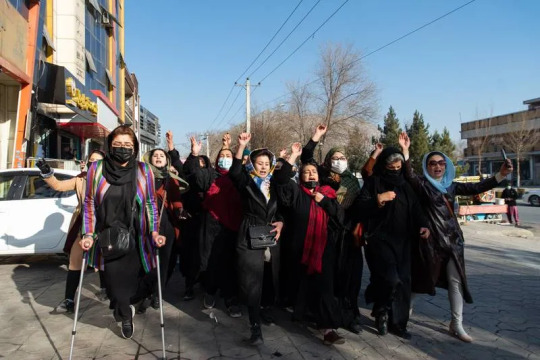
Afghanistan's ruling Taliban announced last month that women would no longer be able to study at universities and higher education establishments. Institutions were told to implement the ban as soon as possible.
Now, a number of British universities have teamed up through FutureLearn to offer the women in Afghanistan free access to digital learning platforms. Girls and women with internet access will be able to study more than 1,200 courses from top institutions at no cost to themselves.
2. Arizona Gov. Katie Hobbs extends protections to LGBTQ+ state employees and contractors

Arizona’s newly elected Gov. Katie Hobbs (D) signed an executive order extending employment protections to state employees and contractors who are LGBTQ+.
As the Human Rights Campaign reports, the executive order, signed on Hobbs’s first day in office Tuesday, directs the state’s Department of Administration to update hiring, promotion, and compensation policies for all state agencies to prohibit discrimination based on sexual orientation and gender identity and include provisions in all new state contracts to prohibit discrimination based on sexual orientation and gender identity.
3. EU Carbon Emissions Drop To 30-Year Lows

It was supposed to be a dirty autumn and winter, with European nations scrambling to replace Russian gas with high-polluting coal. But according to the Centre for Research on Energy and Clean Air, the cold seasons so far have been the cleanest in more than 30 years.
4. Critically endangered rhinoceros gives birth to calf at Kansas City Zoo on New Year's Eve

The Kansas City Zoo got a special start to the new year: A critically endangered subspecies of rhinoceros gave birth to a calf on Dec. 31, officials announced. The calf is walking, nursing and even playing with its mother, Zuri, animal specialists said.
5. Cancer Vaccine to Simultaneously Kill and Prevent Brain Cancer Developed

Scientists are harnessing a new way to turn cancer cells into potent, anti-cancer agents. A new stem cell therapy approach eliminates established brain tumors and provides long-term immunity, training the immune system to prevent cancer from returning.
link to the paper …
6. The US has approved use of the world's first vaccine for honey bees.
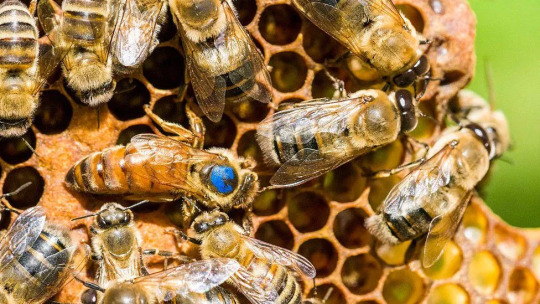
It was engineered to prevent fatalities from American foulbrood disease, a bacterial condition known to weaken colonies by attacking bee larvae. As pollinators, bees play a critical role in many aspects of the ecosystem.
The vaccine could serve as a "breakthrough in protecting honey bees", Dalan Animal Health CEO Annette Kleiser said in a statement. It works by introducing an inactive version of the bacteria into the royal jelly fed to the queen, whose larvae then gain immunity.
7. Cat missing for nearly 6 years reunited with owner thanks to microchip

West Sacramento woman got the surprise of a lifetime Saturday when she was reunited with her missing cat after nearly 6 years thanks to microchip.
- - -
That's it for this week. If you liked this post you can support this newsletter with a small kofi donation:
Buy me a coffee ❤️
Subscribe for more weekly wholesome news...
478 notes
·
View notes
Text
3 Trans Athletes on Why Being Excluded From Women’s Sports Is So Devastating | SELF
Laws to ban transgender athletes at the scholastic level have swept across the US, with 25 states adopting them. At the elite level, policies enacted by sporting governing bodies have impacted the rights and lives of trans athletes in everything from cycling to track and field to chess.
These restrictions often focus on imaginary trans people who are painted as scary boogeymen rather than the real people who are impacted by these bans. In a study published in the Journal of the American Medical Association in June 2023, researchers theorize that the reason trans people face high rates of suicidality and depression may be because they live in a world in which they face immense amounts of bullying and discrimination simply for being who they are. A 2023 study from the Williams Institute at the UCLA School of Law found that 81% of transgender adults in the US have thought about suicide, 42% of transgender adults have attempted it, and 56% have engaged in non-suicidal self-injury over their lifetimes.
34 notes
·
View notes
Text
Pain emerges as dominant symptom in long Covid, UCL study reveals - Published Aug 28, 2024
Pain may be the most prevalent and severe symptom reported by individuals with long Covid, according to a new study led by UCL (University College London) researchers.
The study, published in JRSM Open, analysed data from over 1,000 people in England and Wales who logged their symptoms on an app between November 2020 and March 2022.
Pain, including headache, joint pain and stomach pain, was the most common symptom, reported by 26.5% of participants.
The other most common symptoms were neuropsychological issues such as anxiety and depression (18.4%), fatigue (14.3%), and dyspnoea (shortness of breath) (7.4%). The analysis found that the intensity of symptoms, particularly pain, increased by 3.3% on average each month since initial registration.
The study also examined the impact of demographic factors on the severity of symptoms, revealing significant disparities among different groups. Older individuals were found to experience much higher symptom intensity, with those aged 68-77 reporting 32.8% more severe symptoms, and those aged 78-87 experiencing an 86% increase in symptom intensity compared to the 18-27 age group.
Gender differences were also pronounced, with women reporting 9.2% more intense symptoms, including pain, than men. Ethnicity further influenced symptom severity, as non-white individuals with long Covid reported 23.5% more intense symptoms, including pain, compared to white individuals.
The study also explored the relationship between education levels and symptom severity. Individuals with higher education qualifications (NVQ level 3, 4, and 5 – equivalent to A-levels or higher education) experienced significantly less severe symptoms, including pain, with reductions of 27.7%, 62.8%, and 44.7% for NVQ levels 3, 4 and 5 respectively, compared to those with lower education levels (NVQ level 1-2 – equivalent to GCSEs).
Socioeconomic status, as measured by the Index of Multiple Deprivation (IMD), also influenced symptom intensity. Participants from less deprived areas reported less intense symptoms than those from the most deprived areas. However, the number of symptoms did not significantly vary with socioeconomic status, suggesting that while deprivation may exacerbate symptom intensity, it does not necessarily lead to a broader range of symptoms.
Our study highlights pain as a predominant self-reported symptom in long Covid, but it also shows how demographic factors appear to play a significant role in symptom severity.
With ongoing occurrences of Covid-19 (e.g., LB.1, or D-FLiRT variants), the potential for more long Covid cases remains a pressing concern. Our findings can help shape targeted interventions and support strategies for those most at risk."
-Dr. David Sunkersing, Lead Author, UCL Institute of Health Informatics
In the paper, the researchers called for sustained support for long Covid clinics and the development of treatment strategies that prioritize pain management, alongside other prevalent symptoms like neuropsychological issues and fatigue.
Given the significant impact of demographic factors on symptom severity, the study underscored the need for healthcare policies that addressed these disparities, ensuring equitable care for all individuals affected by long Covid, the researchers said.
Study limitations included a lack of information on other health conditions participants may have had and a lack of information about health history. The researchers cautioned that the study may have excluded individuals with very severe Covid and those facing technological or socioeconomic barriers in accessing a smartphone app.
The study was led by the UCL Institute of Health Informatics and the Department of Primary Care and Population Health at UCL in collaboration with the software developer, Living With Ltd.
Source:
University College London
Journal reference:
Sunkersing, D., et al. (2024) Long COVID symptoms and demographic associations: A retrospective case series study using healthcare application data. Materials Today. doi.org/10.1177/20542704241274292.
journals.sagepub.com/doi/10.1177/20542704241274292
#covid#mask up#pandemic#covid 19#wear a mask#coronavirus#sars cov 2#public health#still coviding#wear a respirator#long covid
15 notes
·
View notes
Text
Police in Vienna are investigating the deaths of four women and a teenage girl in a 24-hour period.
Three women were stabbed to death by a man in a brothel in Austria's capital on Friday. A suspect was arrested.
Another woman and her daughter were killed in an unrelated incident. Investigators believe the girl's father was responsible.
Campaigners described the day as "Black Friday" and called for urgent action to stop violence against women.
The bodies of three women, believed to be Chinese nationals, were found in a building in the central Brigittenau district at around 21:00 local time (20:00 GMT) after a witness called the emergency services.
The suspect, whom police have described as a 27-year-old Afghan national, was found hiding near the brothel with a knife in his hand.
On Sunday, police said the man had "basically confessed" to the killings during his first interrogation.
The motive is currently unclear but further questioning and investigations are to follow.
Autopsies will be carried out on the bodies of the three victims later on Sunday.
Earlier on Friday, a 51-year-old woman and her 13-year-old daughter were found dead in an apartment in the Erdberg area - about 12km (seven miles) from where the other incident happened.
There is no suggestion they are connected.
Police are still searching for the woman's husband, who is also the girl's father, as investigators suspect he may have strangled or choked them to death.
"The initial investigations, which are currently under way, indicate that blunt force was involved," said police spokesman Philip Hasslinger.
Eva-Maria Holzleitner, the leader of the women's policy department of the opposition Social Democratic Party (SPO), has urged the federal government to call a crisis meeting to discuss the issue of femicide in the country.
"We mourn the murdered women, are thinking about the survivors and call for a national action plan to protect against violence to finally be implemented in order to protect women's lives in Austria," said Ms Holzleitner.
Klaudia Frieben, leader of umbrella organisation the Austrian Women's Ring (OFR), wrote on X (formerly Twitter) that "this day will go down in history as Black Friday with five dead women".
According to the latest data on femicide rates in Austria, published by the Institute of Conflict Research, some 319 women were killed in the country between 2010 and 2020 - mostly by male partners or ex-partners.
The coalition government has vowed to crack down on the issue - pledging almost €25m (£21m) in 2021 to initiatives aimed at protecting women against violence.
36 notes
·
View notes
Text

Lincoln Project
* * * *
VP Harris challenges Trump on immigration
September 19, 2024
Robert B. Hubbell
On Wednesday, VP Kamala Harris spoke at the Congressional Hispanic Caucus Institute’s 47th Annual Leadership Conference in Washington, D.C. Harris took on Trump's nightmarish threat to deport millions of immigrants if he is elected.
Harris said,
While we fight to move our nation forward to a brighter future, Donald Trump and his extremist allies will keep trying to pull us backward. We all remember what they did to tear families apart, and now they have pledged to carry out the largest deportation, a mass deportation, in American history.
Imagine what that would look like and what that would be? How’s that going to happen? Massive raids? Massive detention camps? What are they talking about?
Harris’s speech is here: Harris delivers remarks at Congressional Hispanic Caucus Institute leadership event.
As VP Harris said, it is a dangerous fantasy to believe that Trump could deport ten million immigrants. An operation of that scale is beyond the resources of the federal and state governments combined. Although the effort would not succeed, it would lead to economic chaos as the labor pool is jolted by the sudden disappearance of workers who fill entry level service jobs, harvest America’s crops, provide home care for the elderly, and provide significant portions of the workforce in construction, hospitality, and manufacturing industries.
If you don’t have time to watch Harris’s entire speech, I recommend viewing the segment in which she frames reproductive rights as one of the freedoms guaranteed to Americans. She also notes that 40% of Latina women live in states with Trump abortion bans: Harris addresses impact of Trump abortion bans on Latina women.
VP Harris’s comments on abortion and reproductive freedom are powerful and moving. She continues to be an effective, focused campaigner who is sticking to the Democratic messaging of “freedom” and “an opportunity economy.”
As a reminder, Kamala Harris’s Opportunity Economy focuses on making the lives of middle-class Americans better. Her proposals include a $6,000 tax credit for families with newborns, expansion of the child tax credit, expansion of the earned income credit, a $50,000 deduction for new business owners, making rent affordable, incentivizing the construction of 3 million starter homes (as opposed to McMansions), subsidizing $25,000 of the down payment for first time homeowners, and reducing the cost of prescription drugs. See Issues - Kamala Harris for President: Official Campaign Website.
The Federal Reserve cuts interest rates by 0.5%
The Biden-Harris administration significantly reduced inflation levels while sustaining robust growth in the US GDP. As a result, the Federal Reserve announced today that it was cutting the prime interest rate by 0.5% and suggested that additional cuts would be forth coming. See Federal Reserve Board - Federal Reserve issues FOMC statement.
Even Trump admitted that “it was a big cut,” although he suggested the timing was political. In truth, the cut was overdue. The Fed waited too long to reduce rates. See Common Dreams, Fed 'Waited Too Long' But Finally Cut Interest Rates. As noted in the Common Dreams article,
Center for Economic and Policy Research senior economist Dean Baker also welcomed that the Fed is changing course, saying: "This is a belated recognition that the battle against inflation has been won. Contrary to the predictions of almost all economists, including those at the Fed, this victory was won without a major uptick in unemployment."
Kamala Harris and Joe Biden achieved the nearly impossible—avoiding a recession while taming inflation. They deserve great credit for doing so—and voters are starting to realize that fact. See Harris closes gap with Trump on the economy, new Pennsylvania poll shows | Pittsburgh Post-Gazette.
Per the Post-Gazette,
Pennsylvania voters no longer prefer former President Donald Trump over Vice President Kamala Harris on the economy in a poll that shows the Democratic presidential nominee all but erasing the deficit on which candidate can best handle the top issue for voters this fall.
In a Quinnipiac University poll of likely Pennsylvania voters released Wednesday, Trump’s advantage over Ms. Harris was just 50% to 48%, a two-point advantage well within the survey’s margin of error of plus or minus 2.7 percentage points.
Harris continues to do everything just right. While there is no guarantee of success, we should be gratified that we have a candidate who is running such a terrific campaign!
Trump's effort to cram voter suppression bill through Congress fails
Trump ordered Speaker Mike Johnson to make a futile attempt to pass a continuing resolution for the budget that included the GOP voter-suppression bill that would require proof of citizenship to register as a voter. (Note that our nation has survived for 235 years without requiring proof of citizenship to register to vote.) The bill was doomed to fail—and Mike Johnson knew it. But Trump ordered him to jump and Johnson’s only question was, “How high, sir?”
See Roll Call, Johnson's stopgap funding package goes down to defeat.
To be clear, Trump wants to force the US into a financial crisis for political advantage. He said on Truth Social,
If Republicans don’t get the SAVE Act, and every ounce of it, they should not agree to a Continuing Resolution in any way, shape, or form.
But extremists in the GOP caucus know that Mike Johnson will cave. Per Marjorie Taylor Greene, “Johnson is leading a fake fight that he has no intention of actually fighting.”
Americans deserve better than a House GOP caucus willing to hold the budget hostage for Donald Trump.
Trump's desperation is showing
Trump is promising tax cuts like a man who can smell defeat. On Wednesday, he promised New Yorkers that he would remove caps on federal deductions for state and local taxes (SALT). Trump's position is absurd because he proposed and obtained the SALT caps as a way of punishing taxpayers in New York, New Jersey, and California (among other states). Now that he senses that he might lose, he is telling voters in those states that he will remove the caps he instituted.
Members of Congress immediately trashed the idea. Although capping the SALT deduction was unfair to taxpayers in states that fund their operations and pay into the federal coffers, reversing the policy would add $1.2 trillion dollars to the deficit. See HuffPost, Donald Trump’s Latest Tax Pander Flops In Congress.
Trump's flip-flop is a sign of his willingness to promise anything to anyone to be re-elected. Trump's desperation is a more reliable sign of the state of the race than the polls!
Wall Street Journal debunks JD Vance immigrant / cat story
The Wall Street Journal published an article on Wednesday that reported (a) the city manager of Springfield told JD Vance that there was no evidence to support the cat-eating immigrant story before JD Vance doubled-down on the false claim on social media, and (b) the woman who filed a police report claiming her cat had been taken by Haitians later found her cat hiding in the basement of her house.
See Wall Street Journal, How the Trump Campaign Ran With Rumors About Pet-Eating Migrants—After Being Told They Weren’t True (This article is accessible to all.)
Per the WSJ,
[Vance] asked point-blank, ‘Are the rumors true of pets being taken and eaten?’” recalled [Springfield City Manager] Heck. “I told him no. There was no verifiable evidence or reports to show this was true. I told them these claims were baseless.”
By then, Vance had already posted about the rumors to his 1.9 million followers on X. Yet he kept the post up, and repeated an even more insistent version of the claim the next morning.
The WSJ article takes a deep dive into the situation in Springfield and is well worth your time to read the entire article. The WSJ reporters lay out in detail how Vance and Trump are exploiting an immigrant population that is helping Springfield to grow and prosper after decades of decline:
The local economy boomed. Business owners said they were grateful to have workers eager to work long shifts and do what it took to meet production goals. New subdivisions sprung up in the cornfields outside town. New restaurants opened. The Haitian flag flew at City Hall.
Growth came with growing pains. The number of non-native English speakers in the public schools quadrupled to more than 1,000 children. The local clinic and hospital were overwhelmed with people fleeing a country where healthcare had been scant. Traffic increased, as did frustration with drivers more accustomed with the chaotic streets of Port-au-Prince than the orderly grid of Springfield.
One thing is clear: Vance and Trump know the rumors have no basis in fact but continue to promote them—thereby hurting the people of Springfield. Trump claims he will visit Springfield—over the objections of the mayor and the Governor of Ohio (both Trump-supporting Republicans!). The fact that Republicans in Ohio understand the cynical dishonesty of Trump's propaganda is a good sign
[Robert B. Hubbell Newsletter]
#Robert B. Hubbell#Robert B. Hubbell Newsletter#Vance and Trump#JDV#Springfield Ohio#Trump lies#WSJ#Federal Reserve#Voter Suppression
9 notes
·
View notes
Text
OTW Candidates and the Threat of Censorship in Power
Per my policy with this blog, I am creating this post as a centralized information point for the last two cycles of pro-censorship candidates running for @transformativeworks board positions. This is for us, voting members of OTW to have an centralized factual archive of these candidates, which allows us to hold OTW responsible for better screening candidates for views antithetical to the central mission of the organization.
As we know, censorship is on the rise across parts of the internet. These places include geographical territories that OTW's servers sit on. With the resignation of three sitting OTW board members, including one with a history of racist comments, the current election cycle for OTW board became an uncontested cycle that would have been dangerously close to allow an uncontested slot-in for a pro-censorship candidate. With this, I am hoping to increase the amount of transparency and responsibility OTW owes to its voting (and contributing) members.
We as voting members of OTW have the right to choose candidates that will advance the mission of the organization -- we should not, multiple years in a row -- be forced to organize around preventing a pro-censorship candidate from advancing to the Board or accept that such a candidate was could have possibility of being promoted in an uncontested election to the Board.
2022 Election - Tiffany G
Tiffany G's interview statement from her candidacy response. It appears that this text is no longer part of the transcript, but a screencap was preserved by twitter user muzhiyou on August 11 2022. Please click the link to their tweet thread for more context about AO3's banned status in China.
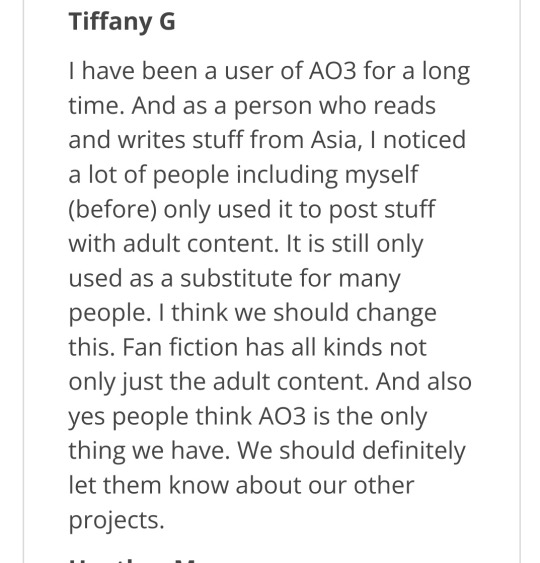
[ID in alt text]
Given that the text transcripts' comments reference in various parts "adult content" but this section is now removed from the chat archive and only contain references to "pedophilic content and other illegal content" the transparency of candidates' views and the the permanency of their archival by OTW are also now in question.
For further nuance and discussion about Tiffany G's candidacy, please review this [non-neutral] thread/discussion about Tiffany's position on censorship with regard to AO3 and the Chinese government.
2023 Election - Audrey R
Upon reviewing candidates for the 2023 election cycle, twitter user mozaikmage noticed that candidate Audrey R was Audrey Richards, an registered Republican who ran for election to the U.S. House to represent Missouri's 7th Congressional District in 2022. (source: Ballotpedia / archive.today version ) Her affiliation for OTW was listed on her Ballotpedia biography.
For additional [non-neutral] discussion of Audrey R's candidacy, please review twitter user fairestcat's breakdown of Audrey's responses and their contention. Fairestcat's views are not representative of my own, the creator of this post. I am merely trying to offer voter perspectives to Audrey's lack of qualification.
Upon further research, twitter user Taenith_Rain was able to unveil more about Audrey R's work with Children and Screens, an organization that advances moral panic around minors' media consumption which has an ultimate goal of censorship. Twitter user Taenith_Rain gave me express permission to archive their research and also asked not to be further engaged on this topic.
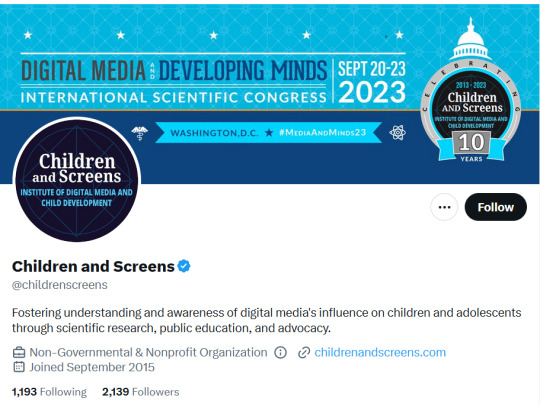
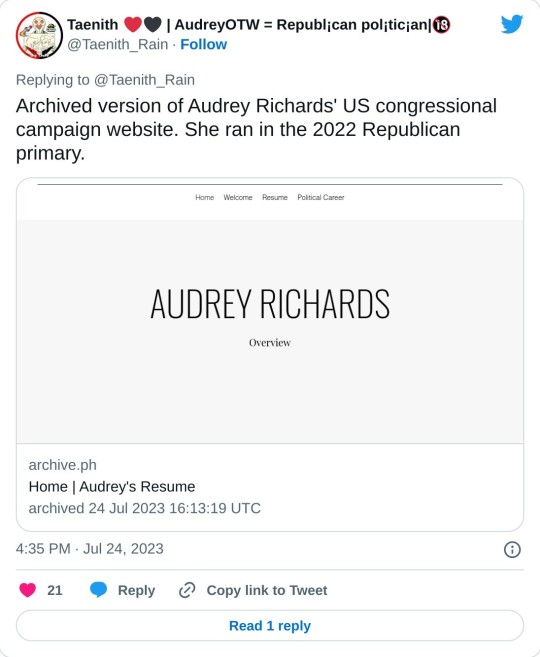
(archive.today link)
Note in her own webpage, her qualification listed as follows:
POLICY LEAD, Institute of Digital Media and Child Development - Create and lead the policy department at a nonprofit research institute dedicated to understanding the impact of digital media use on child development. Create a nonpartisan reputation on Capitol Hill as a scientific resource.
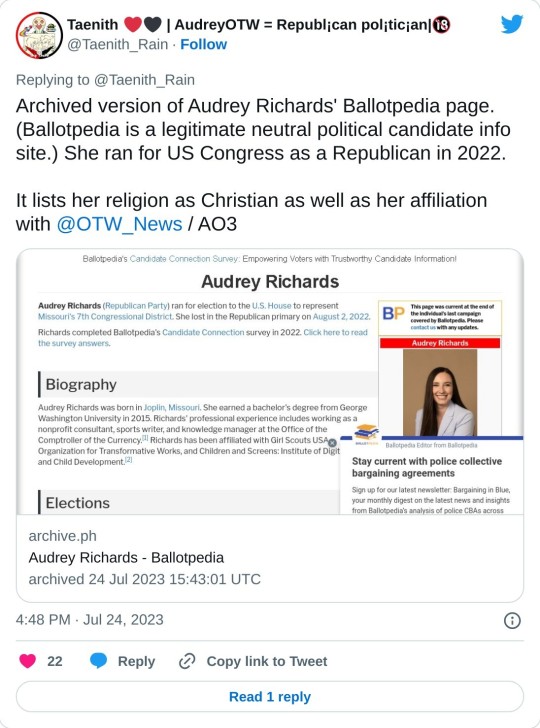
(archive.today link)
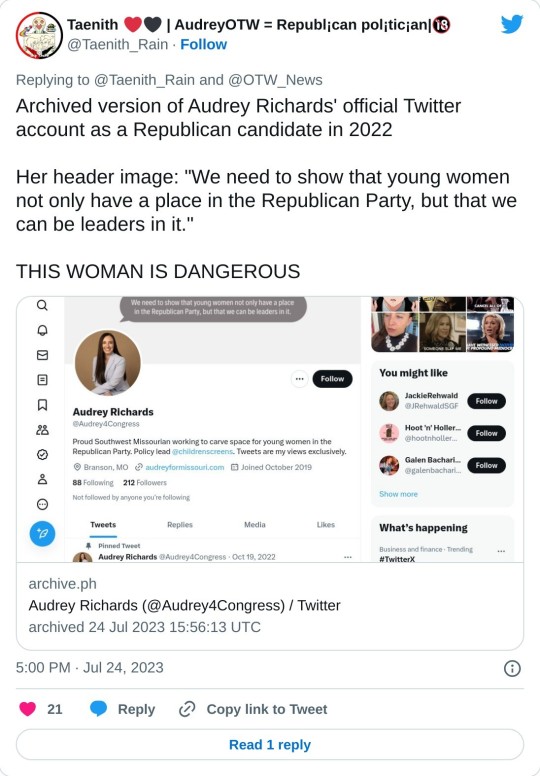
(archive.today link)
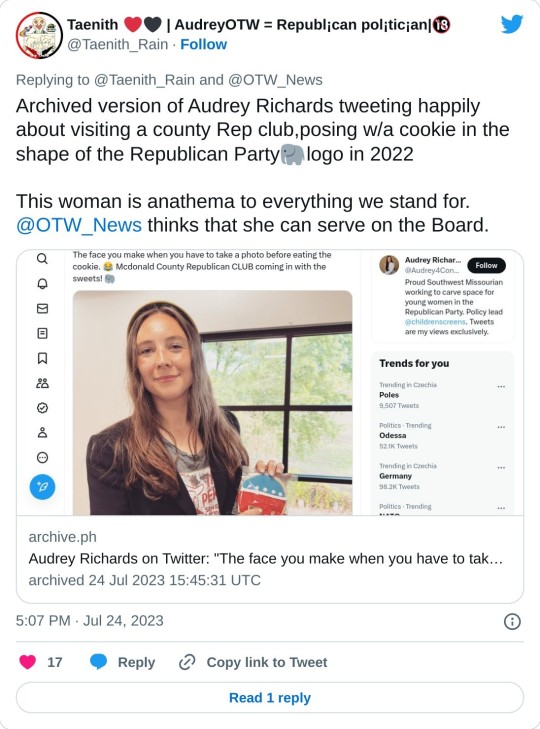
(archive.today link) Please note that the twitter user's comments do not reflect my own opinions about the Republican voters, Republican women, or Audrey R as a person.
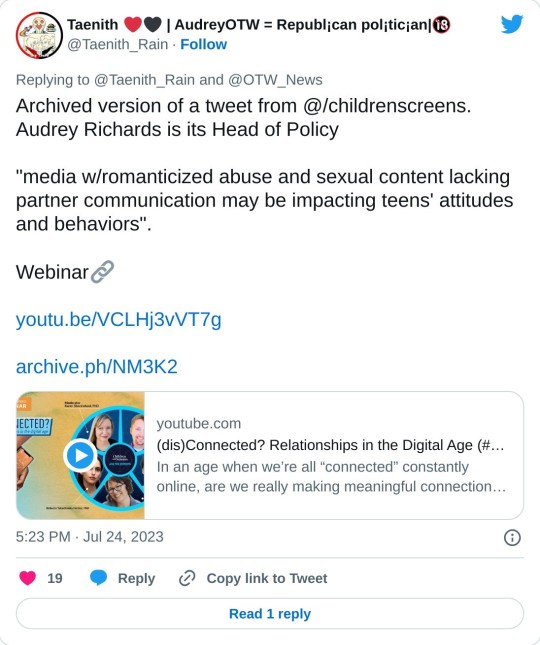
(archive.today link)
Youtube webinar:
youtube
I do want to highlight again the dog-whistle pro-censorship description used for this webinar.
"media w/romanticized abuse and sexual content lacking partner communication may be impacting teens' attitudes and behaviors".
Final Thoughts
I am glad that twice in a row OTW has avoided having a pro-censorship candidate elected to its Board, and that the Stop OTW Racism campaign has led to the successful removal of a sitting board member who has made racist comments.
However, it is unconscionable that two years in a row OTW voting members were forced to reconcile with the fact that there was a pro-censorship candidate running, and had to do extensive research and advocacy to make sure that voters were aware of this risk.
With this archived in one place, I am hoping to hold OTW accountable to better screen candidates to advance the organization's goal of fighting censorship.
Reblogs for knowledge sharing and transparency appreciated.
63 notes
·
View notes